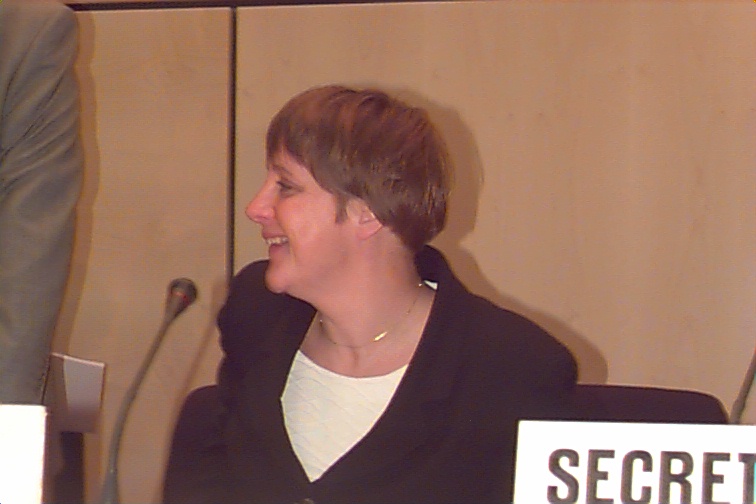
Federal Minister for the Environment Angela Merkel at COP2 via UNFCCC
AGI Asks: What is Angela Merkel’s Climate Policy Legacy?

Carol Hager
Bryn Mawr College
Dr. Carol Hager is professor of Environmental Studies and Political Science at Bryn Mawr College. Prof. Hager teaches courses in comparative politics, environmental politics and policy, comparative public policy, technology and politics, comparative social movements, and German/European politics. A founding member of the bi-co Environmental Studies Department, she also co-founded BMC's New Media Project and served from 2010 to 2017 as Director of the Center for Social Sciences.

Reimund Schwarze
Helmholtz Centre for Environmental Research
Prof. Reimund Schwarze is professor for Environmental Economics at Helmholtz Centre for Environmental Research (UFZ). He was an AICGS visiting fellow in 2013.

Sonja Thielges
German Institute for International and Security Affairs (SWP)
Sonja Thielges is a Geoeconomics Non-Resident Fellow. She was a DAAD/AGI Research Fellow from mid-March to mid-May 2019 and explored foreign policy interests in Germany and the United States related to the countries’ energy transitions. In Germany, she is a researcher at the Research Cluster Climate Policy and Politics at the German Institute for International and Security Affairs (SWP) in Berlin. Her research interests include climate foreign policy, the global energy transition and industrial decarbonization. Her research has been published in studies, policy papers, online blogs, and academic publications.
Prior to SWP, Sonja was head of the Industrial Decarbonization research group at the Research Institute for Sustainability (RIFS, formerly Institute for Advanced Sustainability Studies, IASS) in Potsdam. She was a visiting researcher at the University of Michigan’s Center for Local, State, and Urban Policy in Ann Arbor in 2014 and previously also worked on projects at the Environmental Policy Research Centre (FFU), the Institut für Europäische Politik (IEP) Berlin, and the Centre International de Formation Européenne (CIFE). In 2017/2018, Sonja was a participant in the AGI project “A German-American Dialogue of the Next Generation: Global Responsibility, Joint Engagement,” sponsored by the Transatlantik-Programm der Bundesrepublik Deutschland aus Mitteln des European Recovery Program (ERP) des Bundesministeriums für Wirtschaft und Energie (BMWi). She completed an MA in North American Studies, Political Science, and Modern History at Freie Universität Berlin and Indiana University Bloomington and holds a PhD in political science from Freie Universität Berlin. Her PhD thesis studied climate policy discourses in the U.S. Rust Belt states.

Stephen Milder
Stephen Milder is Assistant Professor of Politics and Society at the University of Groningen.
AGI Asks:
What is Angela Merkel’s legacy on climate policy?
Carol Hager
Bryn Mawr College
Angela Merkel was dubbed the “Climate Chancellor” during her first term in office. Now, at the close of her fourth term, her record is mixed but overall positive with regard to climate issues. Some policy measures that would affect her options had already been put in place by the previous Red/Green government, most notably the Renewable Energy Sources Act (EEG, 2000) and the commitment to withdraw from nuclear power by 2022. Climate policy advocates were optimistic that Merkel would keep Germany on this path, given her scientific training and experience as Environment Minister in the 1990s. As the leader of the Grand Coalition government 2005-2009, Merkel was instrumental in persuading the EU to adopt climate reduction targets. She has been a leading force in lobbying for a binding global climate treaty. She has also taken a leadership role in keeping the 2015 Paris Agreement on track despite the (temporary) withdrawal of the United States and in pledging financial support for climate efforts in the global South.
Merkel’s critics claim her ambitious international climate diplomacy has not been matched by policy leadership at home. She has had difficulty balancing her coalitions’ support for German industry – especially the automobile and lignite coal industries – with domestic greenhouse gas reduction targets. Her unpopular attempt to extend the life of nuclear power plants, walked back after the Fukushima catastrophe of 2011, is viewed as one of her greatest political blunders. Her government’s subsequent support of coal and natural gas as bridge fuels has exacerbated tensions with renewable energy advocates and, along with lagging efforts to decarbonize the housing and transport sectors, has made Germany’s climate goals difficult to attain.
Merkel has been able to leverage recent developments to regain stalled domestic momentum on climate issues. The emergence of Fridays for Future as a political force, the rising political salience of climate change, and surging support for the Greens in the 2018 Bavarian state elections provided impetus for the 2019 Climate Action Law. The need for a COVID-19 recovery package gave an opportunity to outline a “green recovery” that prioritizes decarbonization of the transport sector. When the high court ruled in April 2021 that the Climate Action Law fails to protect future generations, the Merkel government responded immediately by accelerating Germany’s target date for achieving carbon neutrality to 2045, putting the country back in a leadership position on climate.
Stephen Milder
University of Groningen
As Chancellor, Angela Merkel has demonstrated an impressive ability to make “firm, calm, and rational public statements” in moments of crisis. Perhaps most notably, she reassured Germans and won the hearts of international observers with the simple declaration, amidst the 2015 migrant crisis, “We will manage this!” Merkel used that same firm but rational approach to make a reputation for herself as “Climate Chancellor” already in 2007. That year, she pushed the EU to commit to its “20-20-20” emissions reduction policy during Germany’s European Council presidency and deployed her role as host of the Heiligendamm Summit to elicit a commitment to 50 percent carbon reductions by 2050 from her G8 partners.
Despite her important role in international climate negotiations, Merkel’s most significant environmental policymaking came as part of her far less sovereign response to the 2011 Fukushima meltdown, when she paddled back her government’s departure from Gerhard Schröder’s nuclear phase-out and committed herself to an Energiewende (energy transition) based on policies that had likewise been put into place by the previous government. Indeed, the specific means by which long-term carbon reduction goals will be achieved—in Germany, as elsewhere—remain so vague that the German Constitutional Court recently ordered Merkel’s government to implement new policies that stand a chance of achieving Germany’s latest carbon-reduction goals.
Even if her government has hardly legislated an end to carbon emissions, then, Merkel’s rhetorical leadership on the world stage, coupled with the steady growth of the German renewable energy industry throughout her administration, has helped turn Energiewende into a popular loanword and given Germany its nascent reputation as a “Green Superpower.” Thus, the feeling that heavily industrialized Germany will somehow “manage this,” too, and achieve zero carbon emissions by mid-century—and thus serve as a global green model—is perhaps her most significant environmental legacy.
Reimund Schwarze
Helmholtz Centre for Environmental Research (UFZ)
With Chancellor Merkel, not only a convinced European but also a convinced supporter of multilateralism is leaving the stage. While her foster father Helmut Kohl was a European out of a well-understood German interest, Angela Merkel became an advocate against nationalism and isolationism, as it recurrently flares up in the United States, because there is simply no alternative to global action in the fight against climate change. She has remained steadfast to this conviction since the first Conference of the Parties to the UNFCCC (COP1) in Berlin in 1995. To me, she is the mastermind behind the Petersberg Climate Dialogue, the annual meeting of environment ministers from selected countries to explore possible alliances at the upcoming UN negotiations. Founded on the initiative of Germany to address the historical failure of the climate negotiations in Copenhagen (COP15) in 2009, Merkel has attended every year since – calmly, unpretentiously, and out of genuine conviction. Now, shortly before the end of her term in office, she has taken a sober stock of her climate policy. “When I look at the situation, no one can say that we have done enough,” Merkel said in June in her last parliamentary interrogation of the government in the Bundestag. At the same time, she stressed there was significant progress. With the Green Deal, “the EU had set ambitious targets for climate protection”, she said, and her government had worked – as every year, I might add – to “forge global climate alliances.” Where I have been involved as a political scientist, I am proud in retrospect. It was never enough, even in moments of celebration like the conclusion of the Paris Accord, but it was never so devastating as to cast doubt on multilateralism and the power of reason.
Sonja Thielges
Institute for Advanced Sustainability Studies
Angela Merkel’s track record on climate policy has been mixed. Throughout much of the past decade, domestic climate leadership was missing from Merkel’s political agenda and as a result, progress was slow. It was only the COVID-related slow-down of the economy that enabled the country to achieve its 2020 target of reducing greenhouse gas emissions to 40 percent below 1990 levels. The Merkel government had to abandon its unattainable goal of putting one million electric vehicles on the road by 2020. Emissions in the transport sector continue to stagnate. Germany’s phase-out date for coal, 2038, is late and unambitious in international comparison. Its carbon price is far too low to trigger necessary decarbonization efforts. With its recent climate law, the Merkel government has set the goal for climate neutrality by 2045, putting the country on track to meet its Paris Agreement commitments. It was a rule of the German Constitutional Court, not the government that triggered this increase in ambition.
Merkel has a better track record in her international engagement. Germany has become a major financier for international climate efforts, has established many bilateral climate partnerships, and was instrumental in establishing the International Renewable Energy Agency. Asked by the German Bundestag about her climate track record, Merkel herself acknowledged that progress has been made but not enough given the urgency of climate change. Much work is therefore left for the next chancellor. They will have to address major transformation challenges such as decarbonizing transport and industry, increasing renewable energy capacity, and tackling social issues.








